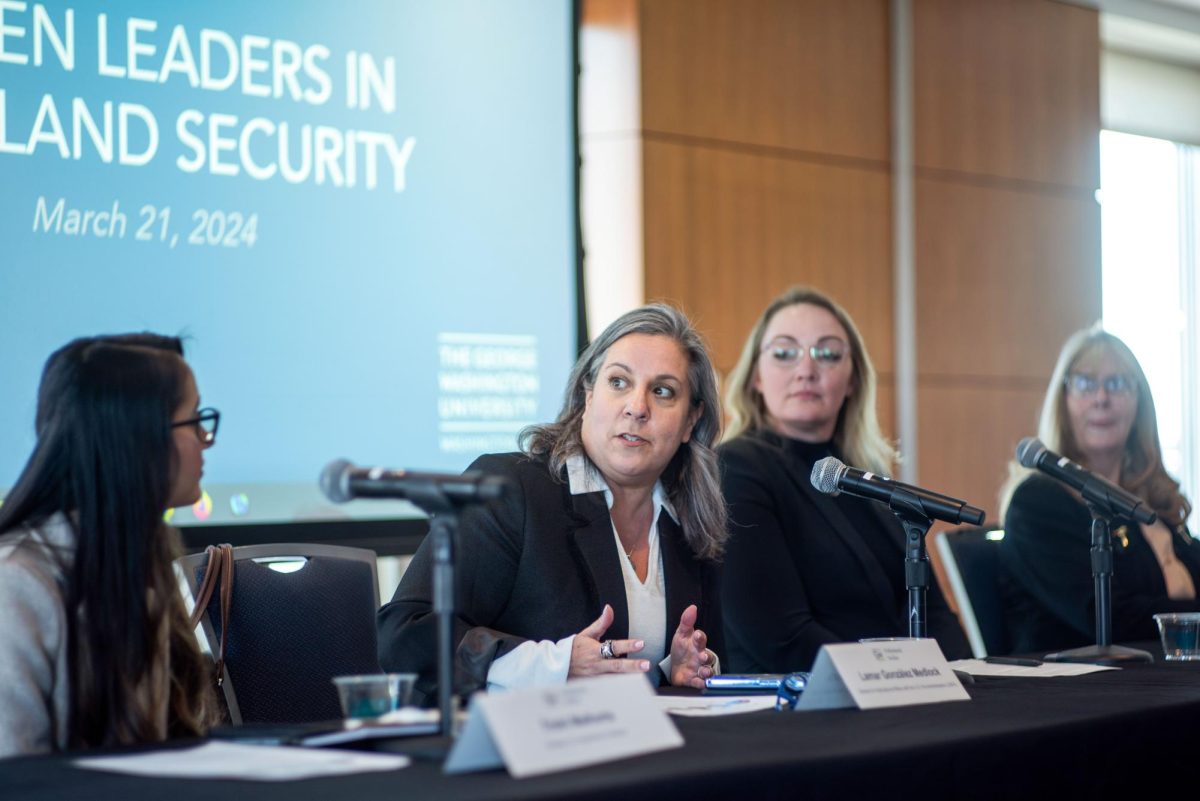Four female leaders in homeland security discussed challenges for women navigating the industry at the Elliott School of International Affairs on Thursday.
Systems Engineer with Transparent Technology Solutions Donna Bartee-Robertson; Emergency Management Specialist at the Administrative Office of the U.S. Courts Lindsay Kuck; Business Financial Manager at the U.S. Department of Defense Trishi Malhorta; and U.S. Fire Administration’s Director of International Affairs Lamar Gonzalez Medlock discussed the benefits of strong mentorship for women in a historically male-dominated field. The College of Professional Studies hosted the conversation, moderated by Program Director Elaine Lammert.
Kuck, an adjunct professor at the University, said her long-lasting relationships with mentors throughout her career have changed the trajectory of her professional path. She said mentors can help women learn the ropes of industries and provide guidance for alternate career paths.
Kuck said as a woman in a male-dominated field, she has learned that male and female communication styles can benefit from collaboration. She said she once worked alongside a male colleague who liked to make quick decisions, whereas Kuck said she often took more time to analyze decisions before jumping straight into a conclusion. She said they were both more successful in collaborating professionally because of their contrasting approaches to facing difficult obstacles at work.
“When we sort of were able to merge our communication styles and come at it from different directions, we found this to be very successful,” Kuck said.
Bartee-Robertson, an adjunct professor at GW Law School, said she has often been doubted by higher-ups throughout her career and has had to push for what she knows is right. She cited a situation when Air Force officials were adamant about deploying wearable biometric technology that she thought should be tested further, which she eventually convinced them to do.
“It wasn’t like, ‘No you can’t use wearables at all,’” Bartee-Robertson said. “Let’s look at a different option here, which will hopefully be something that we can build upon and eventually get to a program that will be beneficial for all the sailors and soldiers and airmen at some point in the future year.”
Malhorta, who received a master’s degree in homeland security from GW, said joining organizations aiming to boost female representation in homeland and cybersecurity, like Girls Security and Girls Who Code, have helped her match with mentors she otherwise would not have sought out. She said these organizations can help alleviate some of the more “awkward” aspects of networking by matching up young professionals with mentors within the same organization.
“I believe these organizations have a couple of hundreds of mentors that they pair young women up with,” Malhorta said. “So that was really helpful for me given my personality type.”
Malhorta said pursuing higher education helped her define her career goals and end up on a path that was more suited to her talents. She said GW’s Director of Career Services Nicole Mintz helped her in her job search by providing her with internships and volunteer opportunities to strengthen her resume and make her a more competitive candidate.
Medlock said she mentored Kuck early in her career when they worked together at the Federal Emergency Management Agency. She said formal mentorships can be very valuable but also said informal “water cooler” conversations with more experienced women can allow young workers to gain valuable career insights. She said she sees it as her “obligation” to share professional advice with younger female professionals because she greatly benefited from information given to her when she was young.
“It really behooves us to continue that cycle, because you’re standing on someone’s shoulders that helped you get to where you are,” Medlock said. “So we need to do the same.”
Medlock said the lack of designs of emergency responder uniforms for varying female body types and a lack of resources for women in the emergency medical field, like lactation stations for mothers, discourage women who are entering the industry. She said when women enter male-dominated industries, a lack of services to support them creates an additional barrier.
“It’s already hard enough being the first,” Medlock said.





